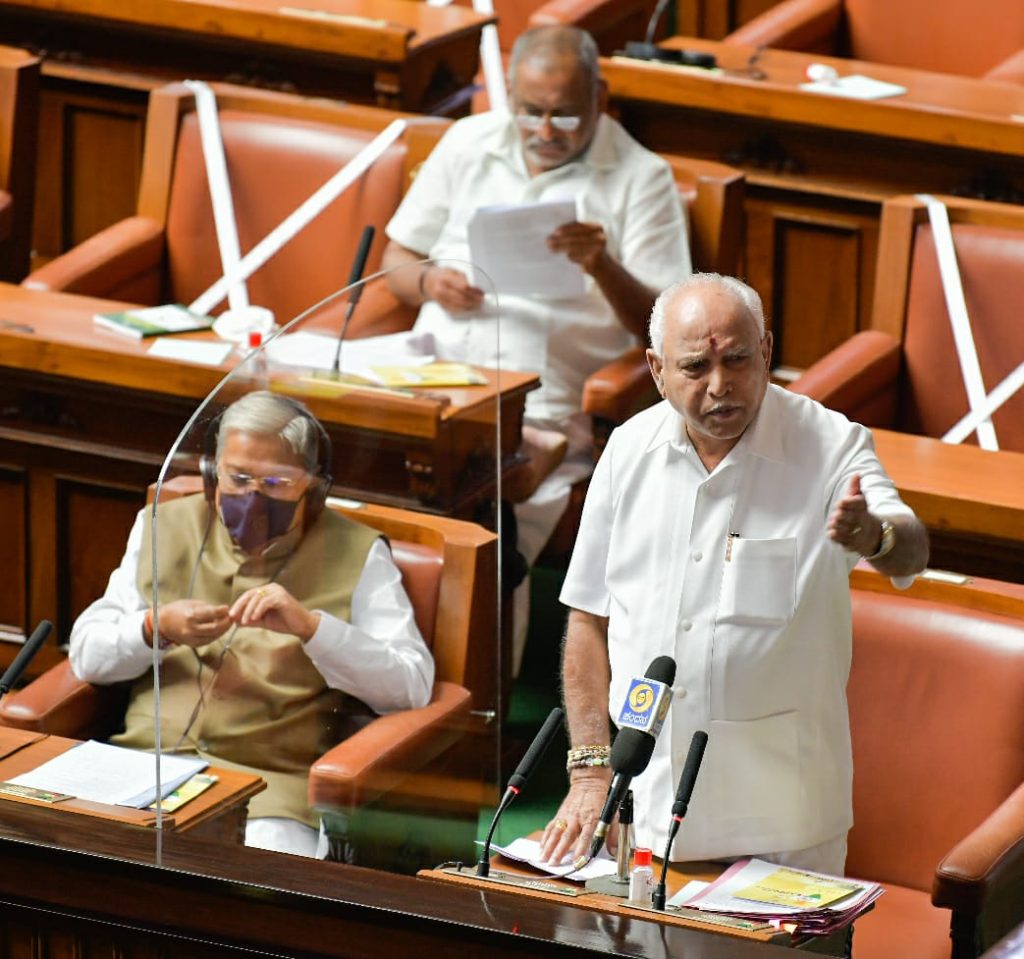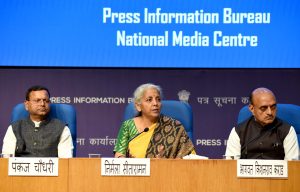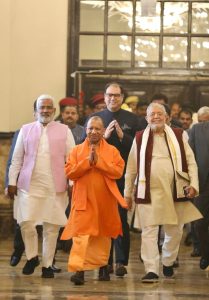New Karnataka mineral policy for 2021-26 on the anvil: Yediyurappa
New Karnataka mineral policy for 2021-26 on the anvil: Yediyurappa

BENGALURU: A new mineral policy for 2021-26 will be unveiled in the State on the lines of the Centre’s National Mineral Policy to give a fillip to the industry and boost the economy, Karnataka Chief Minister B S Yediyurappa said on Monday.
Presenting the budget proposals for 2021-22 in the assembly, Yediyurappa said the government had implemented a mineral policy in 2008 and now plans to introduce it with new reforms.
“We will formulate state mineral policy for 2021-26 on the lines of National Mineral Policy.A single-window clearance system will be introduced to dispose applications for grant of mining/quarry lease and crusher licence in a time-bound manner,” the Chief Minister announced.
To facilitate ease of doing business, the Chief Minister said ‘Mining Adalats’ will be set up to address grievances of applicants.
“Mining adalats will be started at four revenue divisions in the state under a single-window scheme.This will help address the grievances of people and speedy disposal of pending applications to start business,” the Chief Minister said.
The Mines and Geology department is already working on the policy and it will be introduced soon, he added.
The economic activities in the State had come to standstill due to natural calamities, floods and the Covid-19 pandemic. Karnataka State Budget size is Rs.2,46,207 crore.
The budget has been classified into 6 sectors and the details of allocation:
– Agriculture and allied activities are allotted Rs. 31,028 crore
– Welfare and Inclusive growth is allotted Rs. 62,150 crore
– Stimulating Economic growth is allotted Rs. 52,529 crore
– Comprehensive Development of Bengaluru gets Rs. 7,795 crore
– Conservation of Culture, Heritage and Natural Resources gets Rs. 2,645 crore
– Administrative Reforms and Public Service Delivery gets Rs. 52,519 crore
The fiscal deficit was estimated at Rs.46,072 crore in 2020-21. It will be Rs.59,240 crore during 2021-22. Revenue surplus in the previous year was estimated at Rs.143 crore. In this year Revenue deficit will be Rs.15,134 crore. Total Receipts including loans is Rs.2,43,734 crore. The revenue receipts being Rs.1,72,271 crore, it will be less by Rs.7,649 crores than the previous year. Non-tax revenue was at Rs.7,767 crore in the previous year. It is satisfying that non-tax revenues will increase to Rs.8,258 crore (6.3% growth).
The Central Government has provided grant-in-aid of Rs.15,538 crore in the current year excluding GST compensation.
Agriculture Sector
– Implementation of a scheme with Rs.500 crore for encouraging Organic farming.
– Increase in reservation from 40% to 50% to the farmers children in the Agricultural Universities.
– Subsidy being given to the small tractors is extended for 25 to 45 HP tractors.
– Under Atma Nirbhar Bharath Abhiyan subsidy at 35% from Central Government together with an additional subsidy of 15% from State Government to agro-processing and post-harvest management units.
– A sum of Rs. 25 crore is reserved for research in yellow leaf disease of areca nut and encourage growing alternate crops.
– The high-tech cocoon market will be built in Ramanagar at an expenditure of Rs.75 crore.
– Goshala will be established in every district for the protection of Cows.
– To introduce native breeds of cows to our state farmers Samagra GoSankula Samrudhi will be started at a cost of Rs.1 crore.
– 1.5 kilolitres of tax-free Diesel will be distributed at the delivery point to the owners of mechanised boats instead of reimbursement of the taxes.
– For the implementation of Pradhana Mantri Matsya Sampad Yojana an allocation of Rs.62 crores will be made for the year 2021-22.
Irrigation
– To implement the Irrigation schemes of the State on priority an allocation of Rs. 21,000 crores have been made.
– Important schemes like Upper Krishna Phase-III, Yettinahole, Mahadayi, Mekedatu and Upper Bhadra will be implemented on priority.
– An allocation of Rs. 5,500 crore has been made to implement UKP-III and other schemes of Krishna Bhagya Jala Nigam.
– 1348 vented dams will be constructed under the Pashchimavahini master plan scheme over the next five years at a cost of Rs. 3,986 crores an allocation of Rs. 500 crores have been made for the same in 2021-22.
Education, Health and Other Development Sector
– An allocation of Rs. 100 crores for the development of Karnataka Public Schools. Repairs and maintenance of school toilets will be taken up at a cost of Rs. 100 crores through Panchayat Raj Institutions.
– To improve the learning standards in schools, a technology-based teaching system has been implemented in high schools.
– Priority to improve the health services of the State 250 model Primary Health Centres will be developed. In order to give better treatment facilities beyond Bengaluru, regional cancer centres will be established at a cost of Rs. 100 crores in Shivamogga and Mysore. Sub centre of Jayadeva Cardiology Institute will be established in Davanagere.
– 50 Post Matric hostels will be started at a total cost of Rs. 50 crores by Social Welfare Departments. This will help the 5000 SC/ST students.
– The capacity of Post Matric Backward Classes hostels will be increased by 5% in all hostels which are running in their own buildings. This will help 5000 students.
– Rs. 1,500 crore has been set aside for the development of Minorities.
– Completion of approved and unfinished houses are a priority of our government. 9.74 lakh under-construction houses will complete at a total cost of Rs. 10,194 crores over the next 3 years.
– Drinking water tap connection to 21.75 lakh rural households will be completed under the Jal Jeevan Mission at a total cost of Rs. 4,316.5 crores in the year 2021-22. Bulk water supply will also be given to villages at a total cost of Rs. 25,740 crores.
– Drinking water connections and underground drainage facilities will be provided to ULBs at a total cost of Rs. 900 crores over the next five years by Karnataka Urban Water Supply and Drainage Board.
– Rs. 1,500 crores allocation has been made to Kalyana Karnataka Development Board. Rs. 3,000 crores allocation has been made under a special development plan.
– To increase the coverage of the rail network in the State, State Government has taken up 7 new railway projects for laying 1173 kilometres of the railway line on a 50:50 cost-sharing basis with the Railway Ministry. The estimated cost of these works is at Rs.7984 crore and out of this, the State Government will incur Rs.3991 crore. Further, the State Government is going to spend Rs.2630 crore for the land acquisition for these railway lines.
– It is proposed to develop a Bulk Drug Park having world-class infrastructure facilities at a cost of Rs.1,478 crore with the assistance of the Central Government in 1,500 acres of industrial land at Kadechuru industrial area in Yadgir district.
– Special importance has been given to the development of Bengaluru.
– Efforts will be made for starting the works of Bengaluru peripheral ring road. An allocation of Rs. 850 crores have been made for Bengaluru Sub-urban rail. Namma Metro project will be completed on priority.
– Experience Bengaluru centre will be developed in the land belonging to Mysore Lamp Works Limited in Malleshwaram, Bengaluru.
– Tree Park will be developed in N.G.E.F land in Byappanahalli.
– 57 Jana Aarogya Kendras will be started in Bengaluru at a cost of Rs. 10 crore. BBMP schools will also be upgraded at a cost of Rs. 33 crores.
– Ring road will be constructed in Belagavi and Raichur.
– Development of beaches and eco-tourism will be encouraged and the overall development of tourism will be planned at a total cost of Rs. 500 crore.
– Even in the light of the adverse financial situation, I have strived to protect the interest of all sections of society.
With Press Trust of India Inputs







